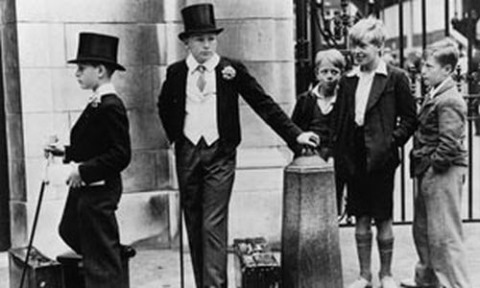
The Underground Thomist
Blog
Shaggy Dogs and HistoriansSunday, 12-21-2014I speculated last Sunday that scholars of different disciplines are attracted to different kinds of humor. What about historians? Historians tend to be acutely aware of irony. Whether they find it funny, though, is another question. In his 2010 book The Historian’s Paradox, Peter Hoffer suggests that historians are not very funny people at all: “As someone who has attended nearly one hundred conferences of historians and sat through countless panels of scholars reading detailed and dry papers followed by commentators reading equally detailed and dry comments, I can say that many historians do not seem fond of humor .... Apparently there is nothing humorous in what we study and humor has no place in how we do our studies.” But I think Hoffer himself is being ironic, and enjoying it too, for he launches immediately into a discussion of the relevance to philosophy of history of shaggy dog stories – tales “whose ending does not quite measure up to our expectations.” Here is his chief exhibit: “A young man decides to discover the secret of life. He wanders all over the world, asking its most revered holy men and women to explain the secret of life to him. Dissatisfied with their answers, he travels to Tibet to seek the wisdom of the holiest man there. From the holy man’s disciples, the seeker learns what he must do to purify his soul and prepare his mind for the answer. For years he practices the most rigorous exercises, and finally he is permitted to approach the holy teacher. ‘Holy man,’ the now older and frailer seeker asks, ‘What is the secret of life?’ The holy man replies, ‘Life is like a bending branch.’ Still perplexed, the seeker asks, ‘How is life like a bending branch?’ The holy man thinks for a moment and then answers, ‘You mean life is not like a bending branch?’”
|
On Being RetoldSaturday, 12-20-2014
I am suspicious of most fashionable theories, but the narrative theory of the self has a certain merit if one doesn’t take the metaphor it is based on too literally. Maybe we could view things like this. In the soul is a story, of which I am the author and in which “I” am the main character. In a sense I make myself up as I go along -- not my entire self, but a part of myself -- the part of myself that is my story of myself. My story of myself, my so-called ego, is what I think of as myself. There is a story of this kind in every soul. But the story is never very accurate. Besides telling it, one of the things a person must do in his life is try to uncover the hidden errors and correct them. Suppose it were rewritten so profoundly that it became, for the first time, wholly true. Yet suppose the old draft with all its errors was not just thrown away, but incorporated into it: “Once I told that misleading story, and tried to make myself into it; now I tell it more truthfully, but part of the truth is that I told it the wrong way before.” The great thing would be to revise the narrative to reflect my real motives, and God’s actions, at every point. The self would still be the main character in the story, but God would be what it was about. Only God can rewrite my story in this way. That is a metaphor for redemption. By His own laws, He will not do so without my go-ahead. That is a metaphor for repentance. As I tell it, my story is full of perjuries – evasions about my motives and attempts at justification, misrepresentations of divine love and apparent neglect, sheer lies by which I treat myself not only as the main character of the story but also as its theme. That is a metaphor for pride. I can never rewrite the story deeply enough. I cannot even get outside it to see how it would have to be rewritten. Only Truth Himself can make both my very self, and my story of myself, wholly true. If only I can see it, if only I can confess it, that is a metaphor for humility. The freshly retold self is something like a child. Perhaps that is a metaphor for the beginning of maturity.
|
Visible and InvisibleFriday, 12-19-2014In a famous talk some years ago, the philosopher Mortimer Adler delivered a lovely refutation of the modern fallacy that we never perceive anything in itself, but only perceive our idea of the thing. As he explained, the only thing I ever perceive is the thing, but I perceive it by means of the perception in the intellect. The classical thinkers called this the “intelligible species.” I do not actually perceive the idea at all – in Adler's term, it is "invisible" to me, like a perfect window. If I try to perceive the perception, all I am really doing is constructing a theoretical representation of it, which is neither the perception nor the thing itself. So the moderns have matters exactly backwards. Pondering this the other day I realized that the fallacy Adler discussed is loosely akin to a variety of other errors that crop up every day. To mention but a few -- 1. The mistaken notion that when I say that I cherish the beloved, what I mean is that I cherish the feeling that the beloved gives me. 2. The mistaken notion that the only thing I ever actually desire is pleasure -- not truth but the pleasure of grasping truth, not beauty but the pleasure of beholding beauty, not God but the pleasure of feeling I know God. 3. The mistaken notion that in order to find myself, I must seek and pursue myself, and that this is the main project of human life. Actually, 1. The only thing I ever really love is the beloved, and to the degree that I cherish my feelings instead, I am not truly loving her at all. The characteristic expression of love is that you are wonderful, not that I have wonderful feelings. 2. The good is indeed what I desire. Pleasure is merely the mode in which I repose in the experience of it. If I focus on my pleasure instead of the good thing, I am no longer experiencing the thing itself, and so most of the pleasure is destroyed. Thus, I am most joyful, not when I am thinking of my joy, but when I am thinking of the thing that causes me joy. 3. In order to find myself I must lose myself. What I catch, when I seem to catch myself, is not my true self, but only my representation of myself, which may be quite distorted. My true self is most fully actual not when I am pursuing myself, but when I am pursuing the things that a being like me is made to pursue. I am most who I am when I forget myself in the light of what transcends me.
|
Libertarianism as the Liberalism of the RightThursday, 12-18-2014Conversation took an interesting turn with a few lively political philosophy undergrads who liked, or thought they liked, self-government and free markets. I suggested that institutions such as the republic and the free market can’t function properly without virtue. They enthusiastically agreed. I suggested that these institutions cannot provide themselves with virtue – it has to come from somewhere else. Like schools? they asked. No, I suggested, schools can’t compensate for disordered families. At best they reinforce the lessons of sound ones. After considering the claim, again they agreed. And families, I suggested, won’t be healthy unless Mom and Dad remain faithful to each other. Right! Right! And that won’t happen unless we give up the idea that sex is an amusement unrelated to turning the wheel of the generations. Dead silence.
|
Upstairs MoralityWednesday, 12-17-2014
Liberalism is an "upstairs" morality, much as “playing the game" and "good form" used to be in the English upper classes. Its chief function is to enable our intellectual, professional, and business classes feel virtuous, while at the same time disguising the political mistreatment of the other classes. Its adages of not “judging” anyone and being “neutral” among conceptions of how to live are in turn disguises for its judgment that the notions of ordinary people are defective, and that their conceptions of how to live are wanting.
|
Getting In a Mess and Getting OutTuesday, 12-16-2014
More than once after giving a talk, I’ve been asked, “How did we get into this mess?” People pose this question in the hope of a simple answer. There isn’t one. No one thing got us into this mess; we were brought here by a great many seemingly independent but converging and reinforcing events, over a period of centuries. Some were epistemological, like how wisdom was displaced by expertise. Some were political, like how technocrats who said they would end social misery found it in their interest to promote a permanent underclass of dependents. Some were psychological, like how the revenge of conscience came to be such a powerful motor of social disintegration. Some were social, like how vulgarity came to be viewed as a mark of perverse sophistication. Some were theological, like how the doctrinal effect of the sola scriptura maxim was precisely the opposite of what was intended. Some were philosophical, like how we put out our eyes rather than recognize and honor the meanings and purposes woven into us. Are you discouraged? I’m not. The very fact that we can enumerate these many tangles means that the untangling is cut out for us. Leave decent people to their imperfect common sense. Abandon the self-righteous nostrum that the best way to help the poor is to undermine them. When you have sinned, don’t reinvent morality; repent. Whatever is true, honest, just, pure, lovely, gracious, noble, and worthy of praise, feast your mind on it. Respect Tradition. Open your eyes.
|
What We Can Do, Even When It Seems There Is Nothing We Can DoMonday, 12-15-2014Often, even if we cannot prevent something from happening, we can do something about how it will happen. I think Alexis de Tocqueville had the right idea about this. The particular spectacle that held him in a trance of fascination was the world-wide disappearance of the old social order with its inherited social ranks, and its replacement by a new social order with equality of social ranks. We democratic souls are hard on the vices of the old order, and nearly blind to those of the new. With a clearer vision of the virtues and vices of both orders, Tocqueville was tempted to nostalgia for what was passing. Yet he thought it would be both futile and impious to seek the old order’s preservation, because he believed that for reasons obscure to us, God had ordained its demise and replacement. What then? Did he say, like the Stoics, that we are helpless to choose what happens, free only to choose our attitude toward it? No, Tocqueville was a Christian. He reasoned that although we cannot prevent disappearance of the aristocratic social order even if we wanted to, it does lie within our power to decide which form the new order will take: Whether we will pursue our desire for equality of ranks by pulling down the high, or by raising up the low. Extend that thought. In every age of society, known goods and evils are disappearing, while new and perilous potentialities are arising. What emerges from these chances, for good or ill, is not fixed. It is always possible to choose the pure, the true, and the beautiful. And though more difficult, it is always possible to refuse complicity in their opposites.
|


